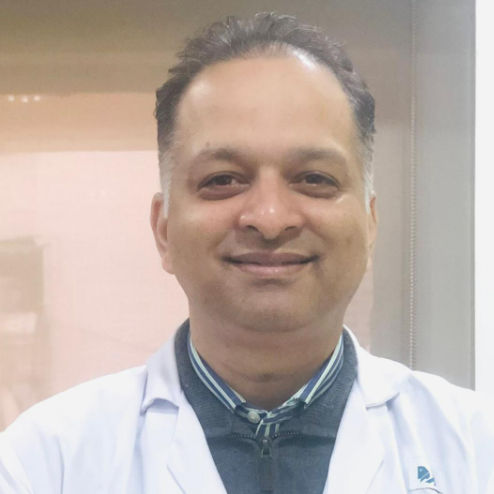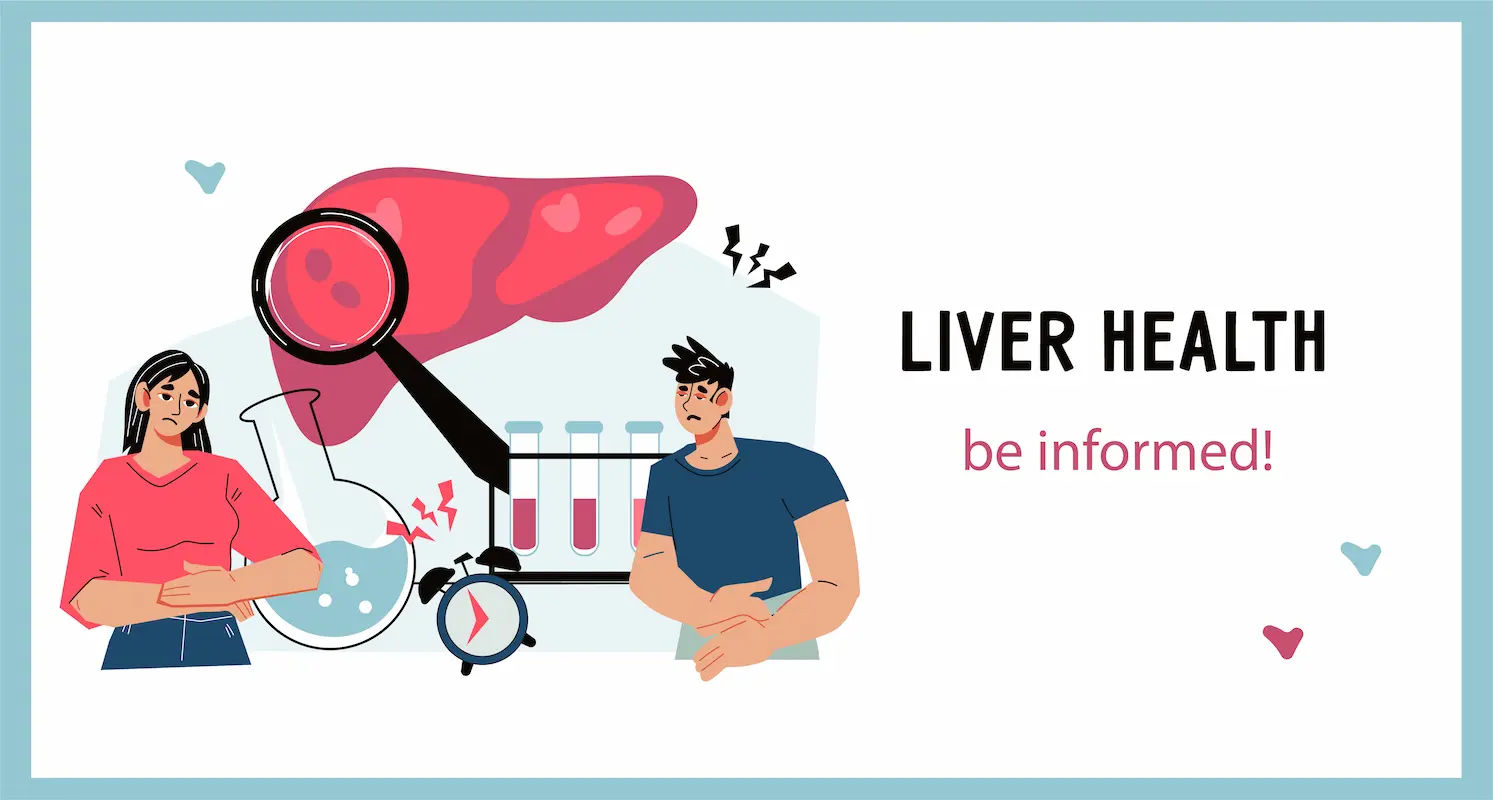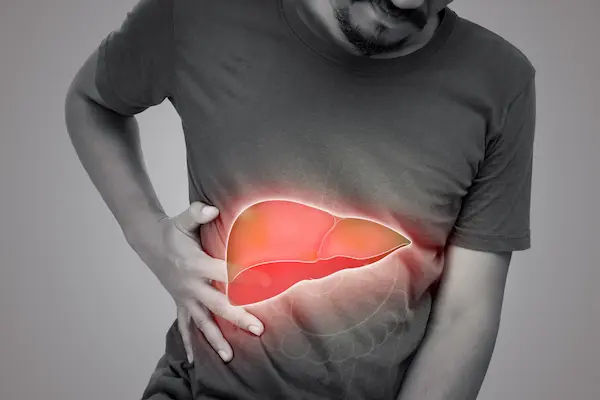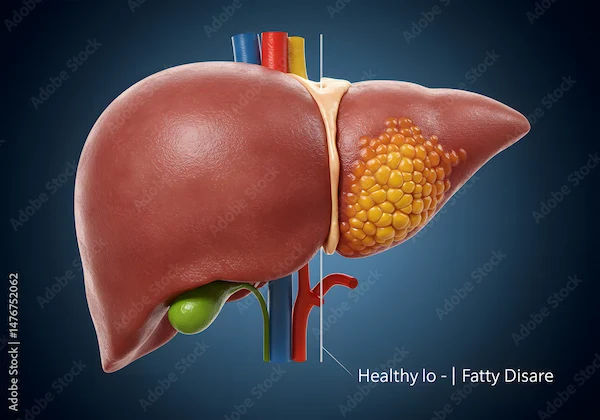Detecting Fatty Liver Disease Symptoms
Fatty liver disease often has no early symptoms, but timely detection is crucial. Learn the signs, causes, and how to manage the condition with diet, exercise, and regular check-ups.

Written by Dr. M L Ezhilarasan
Reviewed by Dr. Dhankecha Mayank Dineshbhai MBBS
Last updated on 13th Jan, 2026

Fatty liver disease is a common condition where excess fat builds up in the liver. While a small amount of fat in the liver is normal, too much can lead to inflammation, scarring, and even liver damage if left untreated. The good news is that early detection and lifestyle changes can help manage and even reverse the condition.
In this article, we’ll discuss the symptoms, causes, and ways to manage fatty liver disease in simple, easy-to-understand terms.
What Is Fatty Liver Disease?
Fatty liver disease occurs when fat accumulates in liver cells. There are two main types:
1. Non-Alcoholic Fatty Liver Disease (NAFLD) – Occurs in people who drink little or no alcohol.
2. Alcoholic Fatty Liver Disease (AFLD) – Caused by excessive alcohol consumption.
NAFLD is more common and is often linked to obesity, diabetes, and high cholesterol. If not managed, it can progress to more serious conditions like liver fibrosis or cirrhosis.
Common Symptoms of Fatty Liver Disease
In its early stages, fatty liver disease often has no noticeable symptoms, which is why many people don’t realize they have it until it progresses. However, as the condition worsens, some signs may appear:
Early Symptoms (Mild or None)
Fatigue or tiredness
Mild discomfort in the upper right side of the abdomen
Advanced Symptoms (If Liver Inflammation or Damage Occurs)
Loss of appetite
Unexplained weight loss
Weakness
Nausea or vomiting
Yellowing of the skin and eyes (jaundice)
Swelling in the legs and abdomen
Confusion or difficulty concentrating
If you experience any of these symptoms, especially jaundice or severe abdominal pain, consult a doctor immediately.
What Causes Fatty Liver Disease?
Several factors contribute to fatty liver disease, including:
Obesity or being overweight – Excess fat increases the risk of fat buildup in the liver.
Insulin resistance or type 2 diabetes – High blood sugar levels can lead to fat accumulation.
High cholesterol or triglycerides – Poor lipid metabolism affects liver function.
Metabolic syndrome – A combination of high blood pressure, high blood sugar, and excess belly fat.
Excessive alcohol consumption – Alcohol directly damages liver cells.
Rapid weight loss or poor diet – Crash diets or high-sugar, high-fat diets can stress the liver.
How Does Fatty Liver Disease Affect Your Health?
If left untreated, fatty liver disease can lead to:
Liver inflammation (steatohepatitis) – Can cause scarring over time.
Fibrosis and cirrhosis – Severe scarring can lead to liver failure.
Increased risk of liver cancer – Long-term damage raises cancer risk.
Heart disease and diabetes complications – Poor liver function affects overall metabolism.
The good news? Early detection and lifestyle changes can prevent progression.
How to Manage Fatty Liver Disease
Let’s see how you can manage fatty liver disease:
1. Healthy Diet Changes
Reduce sugar and refined carbs – Avoid sugary drinks, white bread, and processed foods.
Eat more fibre – Include whole grains, fruits, and vegetables.
Consult Top Hepatologist For More Health Benefits
Choose healthy fats – Opt for nuts, seeds, olive oil, and fatty fish (like salmon).
Limit alcohol – If you have AFLD, quitting alcohol is crucial.
2. Regular Exercise
Aim for 30 minutes of moderate exercise (walking, cycling, swimming) most days.
Strength training helps reduce fat and improve metabolism.
3. Weight Management
Losing 5-10% of body weight can significantly reduce liver fat.
Avoid crash diets—slow, steady weight loss is safer for the liver.
4. Control Underlying Conditions
Manage diabetes, cholesterol, and blood pressure with your doctor’s guidance.
5. Regular Check-ups
Get liver function tests (LFTs) and ultrasounds if recommended.
When to See a Doctor
Since fatty liver disease often has no early symptoms, regular check-ups are important, especially if you have:
Diabetes
Obesity
High cholesterol
A family history of liver disease
If you experience persistent fatigue, abdominal pain, or jaundice, consult a doctor immediately. Early detection is key to managing fatty liver disease. Apollo 24|7 offers:
Liver function tests (LFTs) – Simple blood tests to check liver health.
Ultrasound scans – Non-invasive imaging to detect fat in the liver.
Expert consultations – Speak to hepatologists (liver specialists) for personalized advice.
Conclusion
Fatty liver disease is common but manageable with the right lifestyle changes. Eating a balanced diet, staying active, and getting regular check-ups can help keep your liver healthy. If you’re at risk, don’t wait for symptoms—take proactive steps today!
Consult Top Hepatologist For More Health Benefits
Consult Top Hepatologist For More Health Benefits

Dr. Aakash Garg
Gastroenterology/gi Medicine Specialist
12 Years • MBBS, DNB (Medicine), DrNB (Gastroentrology).
Bilaspur
Apollo Hospitals Seepat Road, Bilaspur
(150+ Patients)

Dr Amey Sonavane
Gastroenterology/gi Medicine Specialist
11 Years • "MBBS, DNB (Internal Medicine) DNB (Gastroenterology) "
Mumbai
Apollo Hospitals CBD Belapur, Mumbai
(100+ Patients)

Dr. Pukhraj Singh Jeji
Gastroenterology/gi Medicine Specialist
13 Years • MBBS, MD ( Internal Medicine ), DM ( Gastroenterology ), Consultant - Gastroenterology
Bhubaneswar
Apollo Hospitals Old Sainik School Road, Bhubaneswar

Dr. E Prabhakar Sastry
General Physician/ Internal Medicine Specialist
40 Years • MD(Internal Medicine)
Manikonda Jagir
Apollo Clinic, Manikonda, Manikonda Jagir
(175+ Patients)

Dr. Rajeev Shandil
Gastroenterology/gi Medicine Specialist
15 Years • MBBS, DNB (Internal Medicine), DNB (Gastroenterology)
Noida
Apollo Hospitals Sector 26, Noida

_1.webp)


